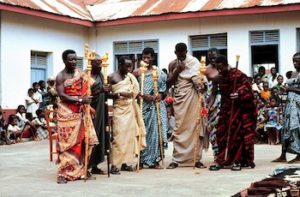
Akan Elders
*This date in 1200 marks the celebration of the Akan community, a meta-ethnicity residing in present-day Ghana's southern regions of the former Gold Coast region.
The Akans, who historically migrated from Ghana, comprise most of the Ivory Coast's population. The Akan language (also known as Twi/Fante) is a group of dialects within the Central Tano branch of the Potou–Tano subfamily of the Niger-Congo family. Elements of Akan culture can generally be seen in many geographic areas. Specific aspects of Akan culture are mainly seen in some Central African populations.
Akan culture has also been historically significant in the New World, where Akan names are or were common, for example, among the Jamaicans, South and North Americans, and others. In Barbados, the descendants of the Akwamu in St. John are Akan. Kofi, the leader of the 1763 slave revolt and violent revolt against the Dutch people in Guyana, was an Akan.
From the 15th to the 19th century, the Akan people dominated gold mining and trading in the region; throughout this period, they were among the most potent groups in Africa. The Akan goldfields were one of three principal goldfields in the area. This wealth in gold attracted white-European traders. Initially, they were Portuguese but were soon joined by the Dutch and the British in their quest for Akan gold. The Akan waged war on neighboring states in their geographic area to capture people and sell them as slaves to Europeans (Portuguese), who subsequently sold the enslaved people along with guns to the Akan in exchange for Akan gold. Akan gold was also used to purchase slaves from further up north via the Trans-Saharan route.
The Akan purchased slaves to help clear the dense forests within Ashanti. About a third of the population of many Akan states were indentured servants. The Akan went from being buyers of slaves to selling slaves as the dynamics in the Gold Coast and the New World changed. Thus, the Akan people played a role in supplying white Europeans with slaves for the Middle Passage. Akan people, especially the Ashanti, fought against European colonialists and defeated them several times to maintain autonomy. This occurred during the Anglo-Ashanti wars: the War of the Golden Stool and other similar battles.
By the early 1900s, Ghana was a colony or protectorate of Great Britain, while the lands on the Ivory Coast were under the French. On March 6, 1957, following Great Britain's decolonization under Kwame Nkrumah's leadership, the Gold Coast was united with British Togoland and the Northern Region, Upper East Region, and Upper West Region of the Gold Coast to form Ghana. Ivory Coast gained independence on August 7, 1960. In 2006, Ghana apologized to the descendants of slaves for the role the Ashanti had played in the slave trade.